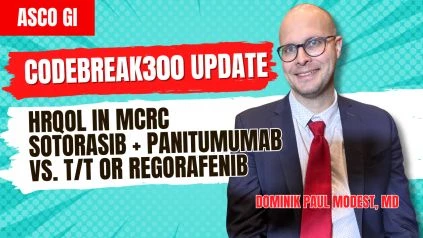OncologyTube: [00:00:00] Okay, here we are at ASCO GI 2024. We have Dominik Paul Modest, MD medical doctor from Charite,University of Medicine in Berlin. Dr. Modest, thank you so much for joining us today. You’re welcome. Today, we’ll be discussing health related quality of life in patients with metastatic colorectal cancer treated with sotorasib and panitumumab versus Trifluoridine,
Tirapercel and regorafenib in Codebreak300, which is featured here at ASCO GI 2024. Dr. Matas, can you provide an overview of the Codebreak300 trial?
Dominik Paul Modest, MD: Sure. Um, it’s a spectacular trial in a way because it’s three arm in a phase three setting on a global level, um, in a small subset. Um, so it’s not a big trial in total numbers,160 patients,on these three arms.
[00:01:00] Um, the trial had two experimental arms,sotorasib and two different doses. Um, each of it combined with panitumumab in a standard dose and,the control arm, standard of care,was trifluoridintipiracil plus,or, um, the regorafenib you could choose. Um, so it was an investigator’s choice control. Um, and the main takeaway that we already had from last year’s esmo, that was the primary endpoint,where, um, the colleague,presented,an improvement by roughly 50%, relatively 50 50%, um, in PFS,in favor of the high dose Soto plus Panny, um, versus the control.
That’s the background we’re talking about.
OncologyTube: Great. Um, how did the change in patient reported outcomes such as fatigue, pain, physical functioning, and global health status, quality of life, differ from between the sotorasib plus PMAB groups and the control group in [00:02:00] the Codebreak300 study?
Dominik Paul Modest, MD: Yeah, that’s one question and I could give you 50 answers because there are so many comparisons.
So we have three arms and we have so many items. So I will try to give you a global perspective on what you’re asking. Um, if we focus on the high dose, because the high dose is the more efficient one and will be developed further, um, I think we can state that all of these items, with the exceptions of diarrhea,were trending to be better or were clearly better,in the assessments in favor of panitumumab plus sotorasib, which might be a bit surprising that this compares one drug.
Um, and the control arm, trifluoridine t piracetiloregoraphanib, to two active drugs, meaning sotorasib and panetumab. So, it’s a quite consistent assessment, um, it’s rather less fatigue, rather less pain, um, better global health, um, and also the social and physical functional scales were trending to be better.
OncologyTube: Okay. Could you explain the significance of the compliance rates for the [00:03:00] PRO assessments being high,greater than 83 percent in the study and how it impacts the reliability of the PRO data?
Dominik Paul Modest, MD: Well, that’s very easy. Bad compliance, bad data. You cannot make up, I mean, if no one complies and gives you the data.
You cannot make any statements. So luckily the compliance rates are really high. So I think we can be confident that what has been presented is what happened.
OncologyTube: All right,based on the results of the Codebreak300 study, what implications do the improvements in patient reported outcomes and the trend towards delayed deterioration have for the use of sotorasib plus panitumumab in the treatment of chemofactory KRAS G12C mutated metastatic colorectal cancer?
Dominik Paul Modest, MD: Um, I think in the upcoming discussion where to put this regimen. Um, whom to recommend this regimen for. I mean, it’s not labeled. It’s not a standard of care yet. Um, this will be one of [00:04:00] the aspects that will be discussed. Usually, if you come up with a new regimen, um, you discuss is it better?that means do patients live longer,either in PFS or overall survival.
And then you have secondary assessments, which is toxicity, patient reported outcomes, sometimes also, also financial aspects if you look all over the world,on a global perspective. And I think these quality of life data will support the implementation of the regimen.
OncologyTube: Okay. Lastly,for our oncologists watching on,the internet, what are the key takeaways from the CCodebreak300 trial?
Dominik Paul Modest, MD: These two. Progression free survival is better and quality of life or patient reported outcomes, um, does not provide, provide a counteractive signal. It tends to be better as well. Um, so we have consistent data so far, but we’re still waiting for overall survival data and we’re still waiting for many more data.
So this is still a very young trial and,the overall message is [00:05:00] not yet on the table.
OncologyTube: All right. This has been an interview with Dominik Paul Modest, MD a medical doctor from Charite University of Medicine in Berlin. Thank you so much for sitting down with us. You’re welcome.

